Microsoft: Satya Nadella steers Windows giant to recovery
- Published
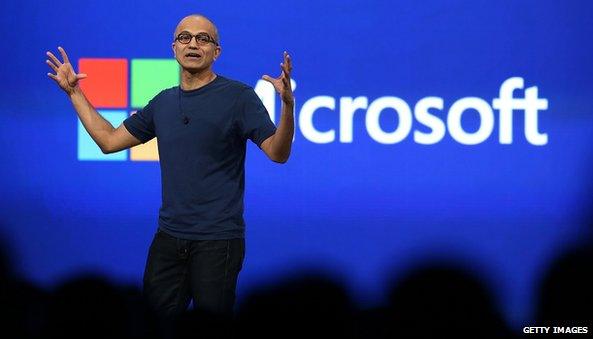
Satya Nadella took charge of Microsoft in February after the early departure of Steve Ballmer
Skim through the technology news feeds, and it is likely that two names will dominate: Apple and Google.
Granted, both companies have new products, but the endless media attention and praise they attract is a reminder of how much has changed.
Twenty years ago, Microsoft was tech's dominant force, Apple was on the decline and Google hadn't even been founded.
Now, it is the Seattle's firm's products that often struggle to register in the public consciousness.
The fact that Microsoft is increasingly focused on business customers, rather than the more closely-followed consumer market, only adds to the challenge.
Microsoft's success has been closely - perhaps too closely - tied to that of the personal computer itself.
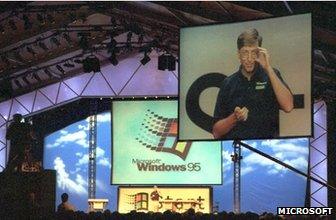
Windows has long been the world's dominant operating system for PCs, but Android and iOS mobile devices are on the rise
It is no coincidence that as PC sales peaked around the turn of the century, so did its value.
In 1999, the software giant was worth $616bn (£385bn) - the most valuable company North America had ever known. It commanded 98% of the PC market.
Over the past decade, there have been several high-profile misfires - everything from the Zune MP3 music player to Windows Vista, which was shunned by both developers and PC-owners.
There have also been missed opportunities - Windows Mobile had the potential to ignite the smartphone market, but was instead squeezed out of it.
Today Microsoft's market cap sits at about $380bn, external.
When you factor in tablets and other pseudo-laptops running rival operating systems, Microsoft's market share stands at around 56%.
Google and Apple have forced Microsoft into being an also-ran, playing catch-up in a mobile-centric era.
Or so goes the script.

Microsoft's products have become the de facto standard for office workers worldwide
In fact, rumours of Microsoft's impending demise are greatly overstated. It still ranks as the world's second most valuable brand in the Forbes list (Apple takes top spot).
Its legendary desktop software Windows is used by more than one billion users globally. Quite aside from its desktop and productivity software, other popular assets, which do not overtly carry the MS moniker, range from Xbox to Skype.
Most significant of all, after the perceived stasis of the Steve Ballmer era, a young, fresh face is at the helm.
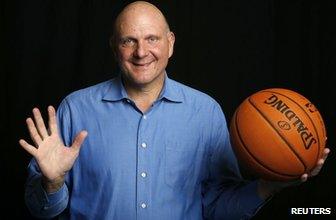
Steve Ballmer was pressured to resign as chief executive and has since quit Microsoft's board altogether. His focus is now the LA Clippers basketball team, which he owns
Satya Nadella is almost the antithesis of the excitable Mr Ballmer; unassuming and erudite.
And though his background is in software engineering, Mr Nadella means business - or, more specifically, a fresh direction for the business.
The Indian-born 47-year-old has spent almost half his life at Redmond in various divisions, and understands the company intimately.
Less than a year into the top job, he's already carving out a leaner operation; one in six staffers has recently been shown the door.
And he laid out a vision: "Mobile first, cloud first."
Only a few months in, Mr Nadella signalled a more open and adaptable Microsoft, first making Office belatedly available for iPad and then making much of its functionality free to use. The software is also being released for Android.
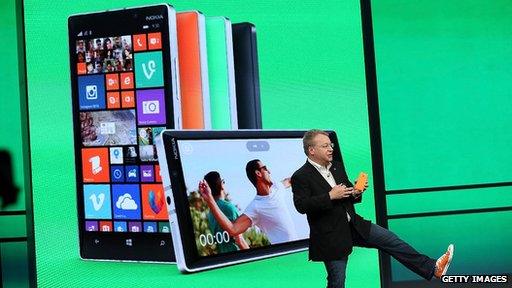
Microsoft's purchase of Nokia's handset division is intended to give it more control over the fate of Windows Phone
In desktop, the upcoming Windows 10 promises to fix the damage wrought by Windows 8, appealing to both desktop users, as well as the "corridor warrior" tablet devotees.
Of late, the new boss has outlined further plans to make money in the post-PC era: its cloud computing service Azure lets businesses rent computing storage and horsepower; while its Office 365 lets them pay for its productivity suite on a "per user per month" basis.
BBC's Richard Taylor: "Windows 10 features the all-important Start button which people know and like very much"
Mr Nadella himself is no stranger to cloud computing - he previously ran Microsoft's division for several years. And he is able to take advantage of its pre-existing relationships with enterprise IT departments.
Over dinner recently, the Microsoft boss outlined to me how he sees the cloud occupying a far more central role in the next few years.
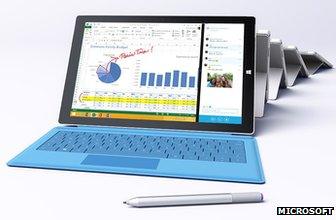
Despite positive reviews for the Surface Pro 3, Microsoft did not make it into IDC's recently published list of the five bestselling tablet-makers
There is still a long journey ahead: annual revenues from internet-based services make up less than 5% of company revenue, external, generating about $4.5bn - less than Windows makes in a single quarter.
But it is the success of services that will determine Microsoft's future success or failure.
By his own admission, Mr Nadella acknowledges that to some degree he is benefiting from plans set out before he took over.
And he is on a steep learning curve as a high-profile company leader, recently apologising for a faux pas in which he suggested women should not ask for a pay rise but instead trust "karma".
The resulting barrage of publicity was hardly the kind he wanted.
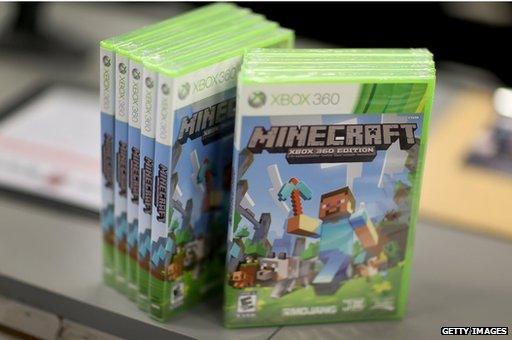
Mr Nadella's $2.5bn takeover of Minecraft developer Mojang caught many by surprise
Regardless, Wall Street takes a bigger view, and is cheering his progress.
Microsoft's market valuation again outstrips Google's, at some $400bn, and its share price has risen by more than 30% over the year - the highest it has been for a decade.
There are still tasks for Microsoft and Mr Nadella to complete if they are to fully confound the critics.
The Windows Phone mobile operating system barely registers on the radar globally, and the purchase of Nokia could add to its mobile business losses.
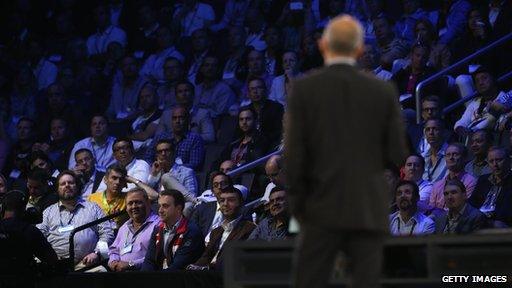
Microsoft's share price has risen under its new leader, but challenges lie ahead
Microsoft's third generation of Surface PCs-cum-tablets are finally winning decent reviews and doubling sales, but they are still a niche product, external, and doubts about the software giant's move into mobile hardware persist.
But there is a renewed spring in Microsoft's step. And with a new man in charge, it is assuming a self-confidence not seen for many a year.
- Published23 October 2014
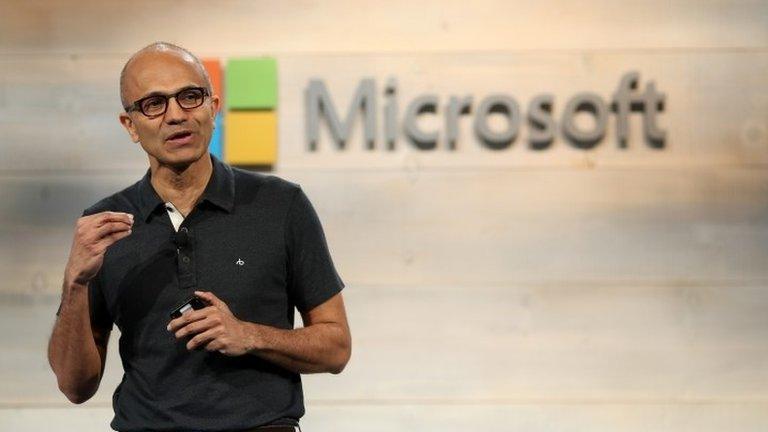
- Published10 October 2014
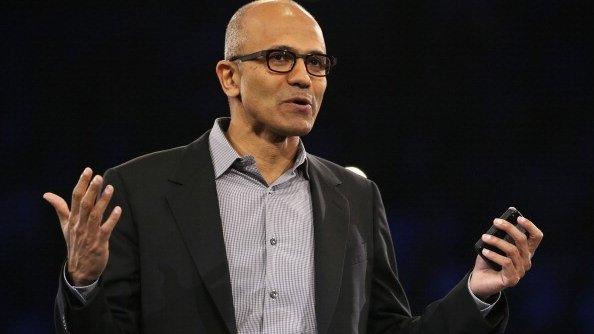
- Published1 October 2014
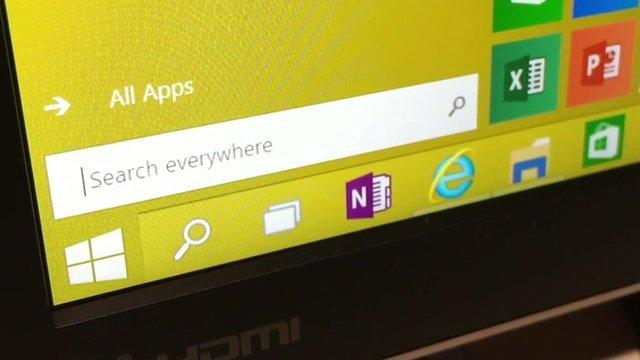
- Published15 September 2014
